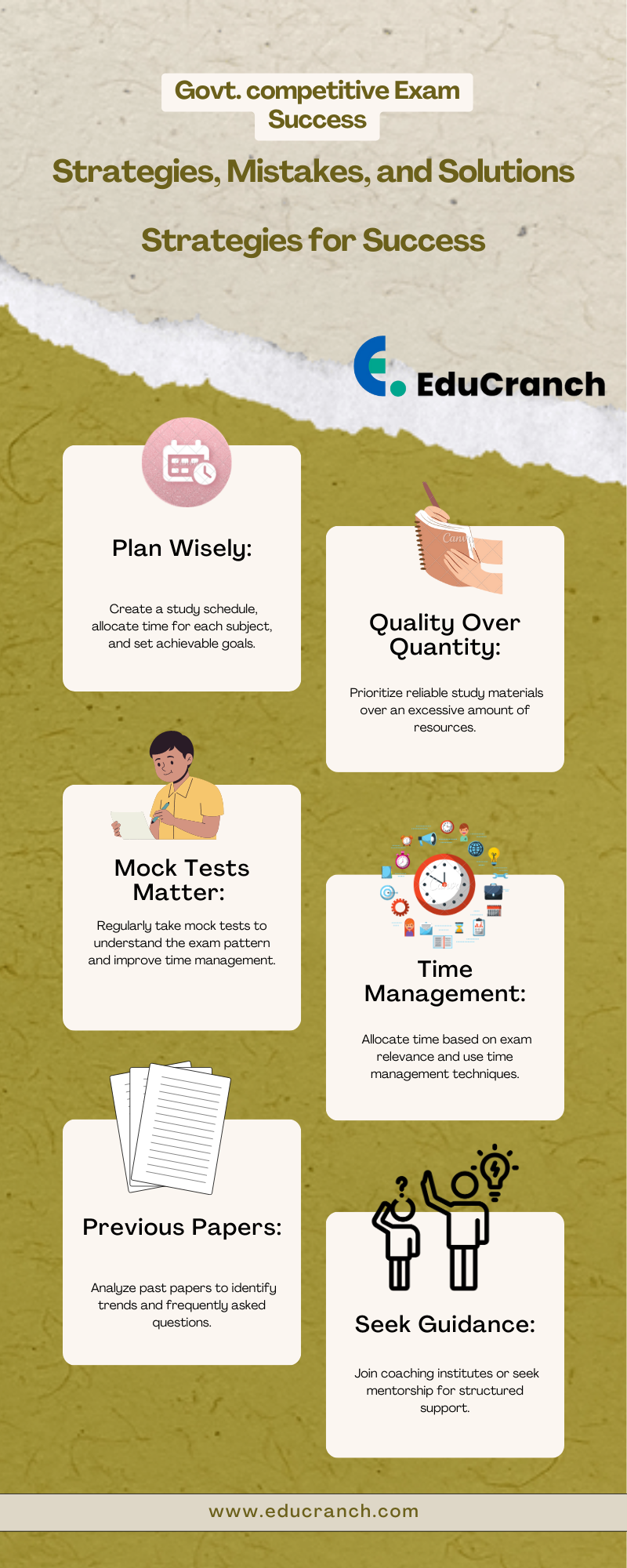Navigating the Path to Success in Government Exams: Strategies, Pitfalls, and Solutions
Published on : September 30, 2023
Published by : admin
2 minutes read

In the competitive realm of government exams in India, the pursuit of success requires more than just hard work and dedication. It necessitates a well-defined strategy that considers the unique demands of exams such as SSC, bank, RLY-Railway, KVS, DSSSB, and REET. At EduCranch, we are committed to empowering students, teachers, and parents with knowledge and insights. In this comprehensive guide, we will delve deeper into the world of government exams, highlighting common mistakes, and providing in-depth solutions for aspiring students.
Understanding the Complex Terrain
Before embarking on this journey, it's crucial to recognize the diversity among these examinations. Each has its distinct syllabus, pattern, and level of complexity. Thus, your approach to preparation should be nuanced and tailored to the specific exam you aim to crack.Common Mistakes and Their Remedies
-
Absence of a Well-Defined Plan
- Mistake: Many students plunge into their studies without a structured plan, resulting in confusion and inefficiency.
- Solution: Create a meticulously detailed study schedule. Allocate dedicated time for each subject, break down the syllabus into manageable portions, and establish achievable goals. You must look for a roadmap for the same.
-
Information Overload
- Mistake: It's common for students to accumulate an excessive amount of study material, leading to overwhelm.
- Solution: Prioritize quality over quantity. Select a few reputable sources and stick to them. Thorough revision of these materials will serve you better than superficial skimming of numerous texts.
-
Neglecting Mock Tests
- Mistake: Students often underestimate the importance of mock tests in their preparation.
- Solution: Regularly engage in mock tests. They provide valuable insights into the exam's structure and help you fine-tune your time-management skills. You need to review your improvement to identify the mistakes you are making. You must review your own performance. So, that you can identify the improvments you need.
-
Ineffective Time Management
- Mistake: Poor time management can lead to incomplete syllabus coverage.
- Solution: Strategically allocate time to each subject based on its relevance and weightage in the exam. Utilize techniques like the Pomodoro method to enhance concentration and efficiency.
-
Disregarding Previous Year Papers
- Mistake: Many students fail to realize the goldmine of information hidden in previous year's papers.
- Solution: Analyze past papers to identify trends, frequently asked questions, and essential topics. This will provide valuable insights and help you focus your preparation effectively.
-
Isolation and Lack of Guidance
- Mistake: Studying in isolation can lead to doubts and confusion.
- Solution: Seek guidance from experienced mentors or consider enrolling in reputable coaching institutes. Their structured support can provide clarity and motivation.
-
Neglecting Health and Well-being
- Mistake: Physical and mental health often take a backseat during intense preparation.
- Solution: Prioritize self-care. Maintain a balanced diet, engage in regular physical activity, and incorporate meditation or relaxation techniques to manage stress effectively.
-
Fear of Failure
- Mistake: The fear of failing can be paralyzing, hindering progress.
- Solution: You need to embrace your failure if you face this by stepping stone to your remarkable success. Maintain a positive mindset and self-belief.
9. Leveraging Technology
- Mistake: Failing to adapt to new technologies can hinder your preparation in the digital age.
- Solution: Embrace e-learning platforms, digital study aids, and online resources. These tools can augment your learning experience and help you stay updated with the latest trends and information.
